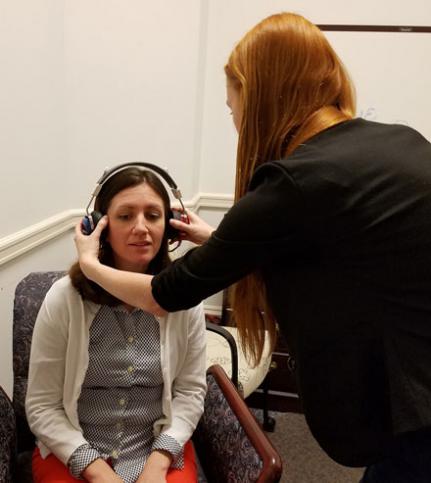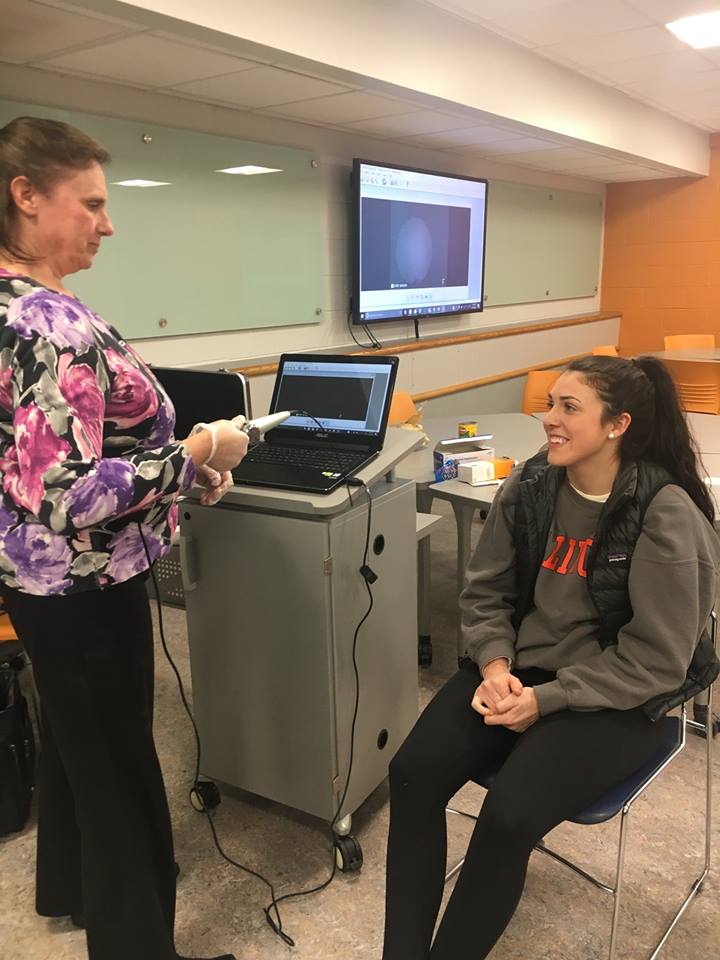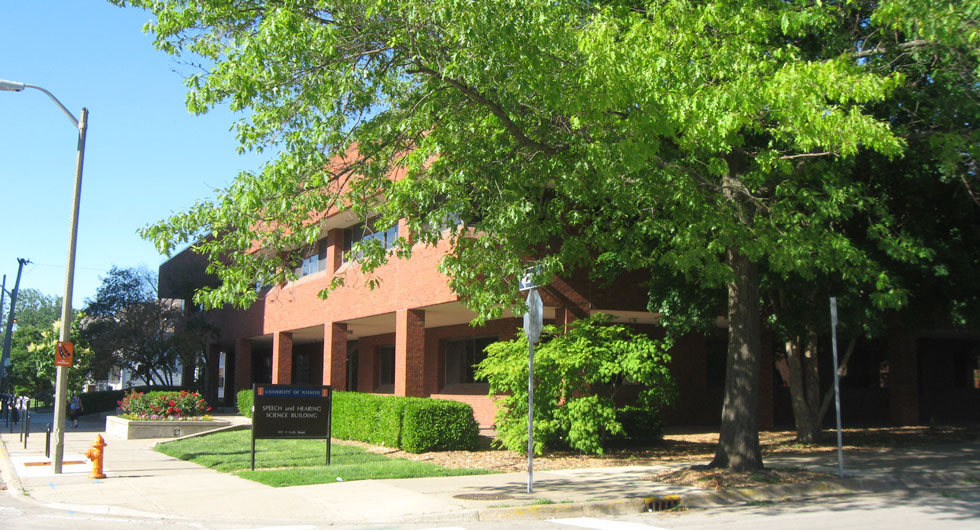Undergraduates who plan to focus on concentrations in either speech-language pathology or audiology have the opportunity to begin observing and participating in the delivery of a full range of clinical services to communicatively impaired individuals as part of a pre-practicum experience in their senior year through the Department’s Speech-Language Pathology and Audiology clinics.
Speech & Hearing Science
The undergraduate curriculum offers a broad background in the biological, behavioral, linguistic, and social foundations of human communication and communication disorders. The major prepares students to pursue a career and/or graduate education in many fields related to communication and healthy communication practices. The program has four concentrations to choose from: Audiology, Speech-Language Pathology, Cultural-Linguistic Diversity, and Neuroscience of Communication.
The Speech and Hearing Science building is located at 901 S. Sixth Street, Champaign, IL 61820. The office address for the undergraduate academic advisor for Speech and Hearing Science, Cathy Warnes, is in room 221 of the Speech and Hearing Science Building. She may be reached by email at: cwarn@illinois.edu or by phone: 217-333-2230.
Audiologists work with the prevention, diagnosis,and treatment of hearing disorders. They evaluate and assess problems with balance and hearing Loss, how they impact the lives of individuals, and how to help clients learn to manage them. They identify and provide treatment to hearing impaired children and adults, which may include fitting and dispensing hearing aids to their clients. More information about the field of audiology may be found on the American Speech-Language Hearing Association.
Encourages students to examine ways that individual communication differences, including disorders, interface with sociocultural systems, institutions, and practices. Students will take courses in theory and research methods to explore ways in which sociolinguistic differences shape development, socialization, and identity. This concentration is intended to help provide students with knowledge related to cultural-linguistic differences (race, ethnicity, socio-economic status, neurodiversity) that is needed to serve an increasingly global society concerned with human rights and responsibilities.
Provides an interdisciplinary understanding of the neurological systems that underlie human communication. Students will study the biological basis of communication in order to understand brain-behavior correlates of typical and disordered speech, language, and hearing function. This concentration is intended to help prepare students for health and science-related careers, including medicine and neuroscience.
Speech-language pathologists diagnose and treat individuals with speech, language, and swallowing disorders. They work with clients of all ages, including children and adults, and provide a variety of services. They assist children who are delayed in their acquisition of speech and language or who demonstrate communicative disorders. They work with both children and adults who have speech and language difficulties, such as stuttering. Speech pathologists also work with adult communicative disorders, as well as voice problems caused by illness or disease or that are surgically related. More information about the field of speech-language pathology and audiology may be found on the American Speech-Language Hearing Association.
- SHS 170: Human Communication: Systems, Processes and Disorders
- SHS 120: Children, Communication and Language Ability (2nd 8 weeks, online)
- SHS 222: Language and Culture of Deaf Communities (1st 8 weeks, online)
- SHS 271: Communication and Aging (Spring only)
- SHS 375: Communication Partners and Health
Students should consult with an academic advisor regarding course selection prior to the advanced registration period.
The program of study in Speech and Hearing Science offers a broad background in the biological, behavioral, linguistic, and social foundations of human communication and communication disorders. The major prepares students for careers or graduate education in many fields. Professionals may be employed in hospitals, rehabilitation centers, public and private schools, medical clinics, private practice, health departments, community centers, colleges and universities, research laboratories, nursing care facilities and many more.
- Knowledge of human communication processes and disorders of speech, language, and hearing
- Familiarity with the services provided by a science-oriented helping profession
- Strong problem-solving skills
- Ability to communicate effectively in group discussion, oral presentations, and in writing
- Enhanced interpersonal skills
- Understanding of human development and behavior
- Ability to use and understand statistical techniques
- Speech- Language Pathologist
- Audiologist
- Rehabilitation Counselor
- Special Education Teacher
- Physical Therapist
- Occupational Therapist
- Physician Assistant
- Applied Behavioral Analyst
- Social Worker
- Clinical Psychologist
- Guidance Counselor
- Physician, Nurse
- Vocal Performance Coach
- Research Assistant
- Down Syndrome Education Specialist
- Paraprofessional Inclusion Aide
- English-as-a-Second Language Instructor
- Child Development Specialist
- Disability Lawyer
- Health Educator
- Audiology support personnel
- Communication aide
- Educational audiologist
- Behavioral management technician
- Mental health technician
- Psychiatric aide
- Social service assistant
- Account representative
- Community outreach worker
- Life skills counselor
- Gerontology aide
- Occupational therapist technician
- Youth worker
- Business consultant
- Project manager
- Consumer educator
- Literacy aide
- Rehabilitation aide
- Volunteer coordinator
- Interpreter
- Event coordinator
- Human resources coordinator
- Research assistant
- Patient advocate
- Fundraiser
- Personal assistant
Some careers may require education beyond an undergraduate degree.
- Participating in undergraduate research
- Applying for a study abroad experience
- Utilizing resources of The Career Center
- Joining a Registered Student Organization (RSO) related to this major, such as:
- NSSLHA (National Student Speech Language Hearing Association): A national pre-professional organization for undergraduate and graduate students interested in the study of human communication and related disabilities. Students may join at the national or local level.
- B.O.S.S. (Bilingual Organization of SHS Students): A student organization that supports students within the department who are interested in the study of bilingual speech and hearing sciences, with the goal of sharing knowledge and experiences, and increasing awareness of multicultural and bilingual issues in speech-language pathology and audiology.
- SAA (the Student Academy of Audiology): For graduate and undergraduate students interested in learning more about the field of audiology and participating in activities that educate, benefit, and advocate for hearing health.
There are several professional organizations dedicated to Speech and Hearing Science. Their websites might be able to provide a glimpse in the world of Speech and Hearing Science. These organizations include American Academy of Audiology and American Speech-Language-Hearing Association.


